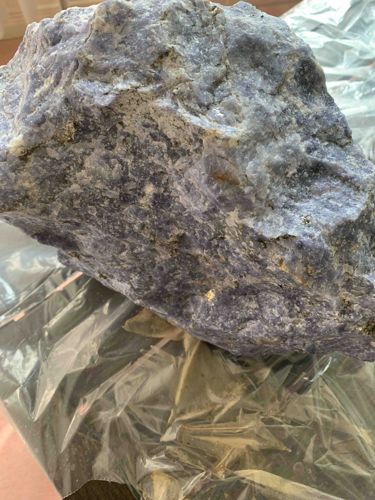
Rough Blue-Gray Mineral Specimen
The item is a raw, unpolished mineral specimen, likely a natural crystal or rock formation, weighing what appears to be several pounds given its substantial size. Its dominant color is a muted, pale blue-gray or lavender, interspersed with areas of lighter grey and off-white. The surface exhibits a rough, irregular texture with numerous natural fractures, pits, and crystalline facets indicative of a natural geode or mineral deposit. There are visible inclusions, possibly indicating the presence of other minerals or impurities, some appearing as small, darker specks or lighter, chalk-like deposits. Scattered throughout the specimen are small areas with a faint yellowish or brownish tint, which could be oxidation, iron staining, or other mineral deposits. The overall form is a large, amorphous chunk, without any signs of artificial shaping or polishing. There are no discernible maker's marks, signatures, or stamps, consistent with a naturally occurring mineral. Its condition appears to be primitive and unaltered, suggesting it was recently extracted or found in its natural state. The lack of wear or damage beyond its natural formation variations indicates it has not been extensively handled or processed. This specimen's unique appeal lies in its natural aesthetics and geological interest.
AI-Generated Appraisal Disclaimer
Estimated Value
$100-250
Basic Information
Category
Mineral Specimen
Appraised On
February 28, 2026
Estimated Value
$100-250
Additional Details Provided By Owner
User Provided Information
Mineral
Item Description
The item is a raw, unpolished mineral specimen, likely a natural crystal or rock formation, weighing what appears to be several pounds given its substantial size. Its dominant color is a muted, pale blue-gray or lavender, interspersed with areas of lighter grey and off-white. The surface exhibits a rough, irregular texture with numerous natural fractures, pits, and crystalline facets indicative of a natural geode or mineral deposit. There are visible inclusions, possibly indicating the presence of other minerals or impurities, some appearing as small, darker specks or lighter, chalk-like deposits. Scattered throughout the specimen are small areas with a faint yellowish or brownish tint, which could be oxidation, iron staining, or other mineral deposits. The overall form is a large, amorphous chunk, without any signs of artificial shaping or polishing. There are no discernible maker's marks, signatures, or stamps, consistent with a naturally occurring mineral. Its condition appears to be primitive and unaltered, suggesting it was recently extracted or found in its natural state. The lack of wear or damage beyond its natural formation variations indicates it has not been extensively handled or processed. This specimen's unique appeal lies in its natural aesthetics and geological interest.
Related Tags
Get Your Items Appraised
Instant estimates of your treasures with AI-powered instant appraisals